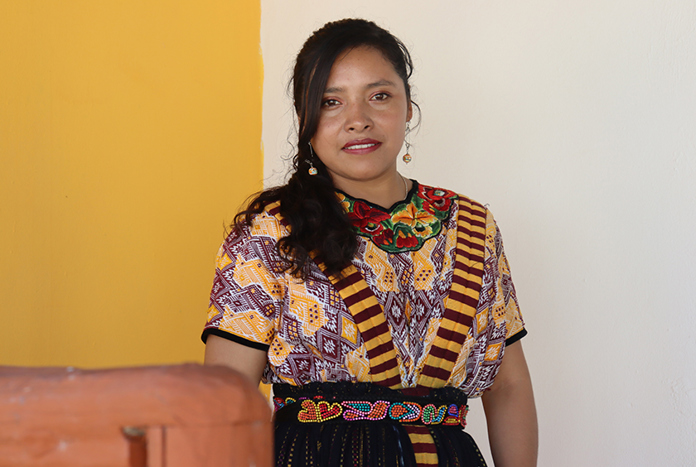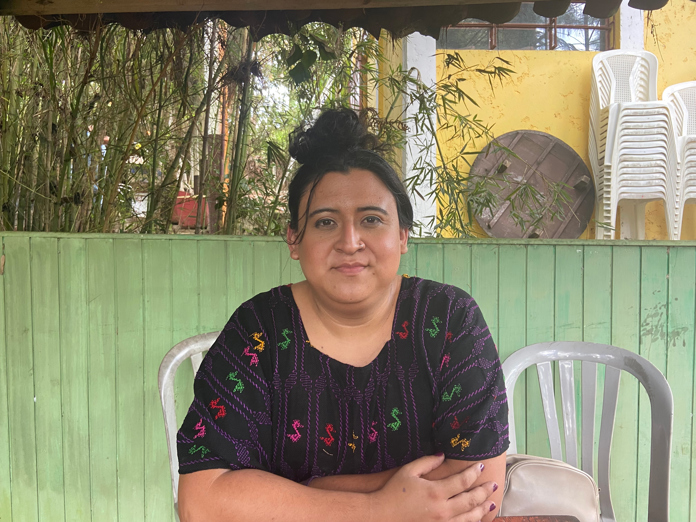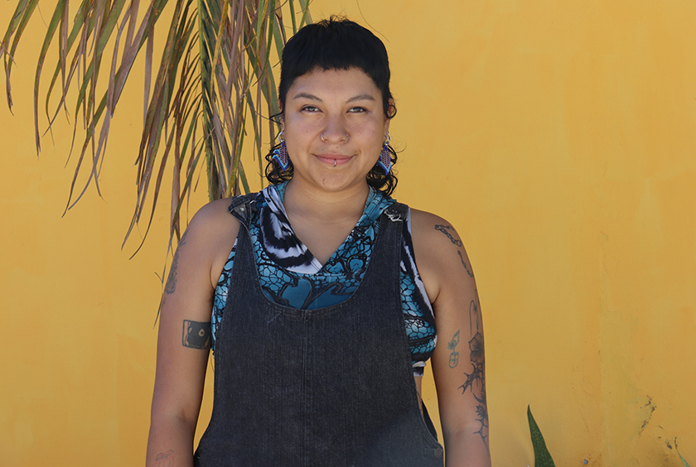
Guatemala and Mexico: A Deep Connection to the Land
October 2025
What Hope Tastes Like
At Amos Trust we have been known to pose the question “What does hope taste like?” Last week, as my trip to Guatemala and Mexico was drawing to a close, I sat at the edge of the water on the chinampas (floating gardens on the outskirts of Mexico City) eating a delicious empanada full of vegetables grown and harvested traditionally from the land, and found myself thinking, “this, this is what hope tastes like…”
Amos Trust’s Climate Fellowship supports young women land defenders and climate activists across Mexico and Central America. Every year, 12–14 participants join a year-long programme where they are given training, the chance to network and learn from fellow participants and funding towards a project to tackle climate and gender injustice in their particular territory.
Many participants are Indigenous young women who come from the different Indigenous communities throughout Mexico and Central America. These women reflect the central role often played by Indigenous women in protecting the land and preserving the knowledge of their ancestors in the face of man-made climate change, exploitation and overconsumption.
Myself and Alexia, my colleague at Amos who leads on this project, recently visited six of this year’s cohort based in Guatemala and Mexico. There were so many signs of hope to be found amongst the difficult circumstances many of the women and their communities are facing.
Before sharing some of these women’s stories, I want to reflect on a common theme that came through in each of their stories — the deep sense of connection they expressed between their bodies and the land. Many of the women talked of seeing the defence of the land as linked to the defence of their bodies.
Amos Trust’s Climate Fellowship supports young women land defenders and climate activists across Mexico and Central America. Every year, 12–14 participants join a year-long programme where they are given training, the chance to network and learn from fellow participants and funding towards a project to tackle climate and gender injustice in their particular territory.
There are high levels of violence against women prevalent in many of the areas where we are working and they see attacks on the land as being equal to attacks on their own bodies. They feel the land suffering from the actions of extractivist companies who are mining for lithium or other products or through deforestation by large agricultural corporations. And of course, they recognised that the pollution of the water and air is also an attack on people’s bodies, making them and their communities sick.
Chahim, a Fellowship participant from Guatemala, pointed to the mountains where we could see the land that has been cut away by a mining company. She said, “when I look out at that I feel the violence against mother earth in my body”. As she said this, and I looked at the scar left on the side of the mountain, I was able to understand this sense of connection with the earth — recognising how I feel when one of my children is hurting, whether emotionally or physically. I feel it in my body and that’s when I truly understood how closely linked these women feel to the land of their ancestors and how this shapes all that they are and do.
Fabiola

Empowerment: Fabiola Quijivix from Guatemala
— — — — — — —
Fabiola, a leader of the Maya K’iche’ people (an Indigenous people from Guatemala), lives in Quetzaltenango, a rural region surrounded by mountains and four volcanoes. Mining in Fabiola’s community ended recently due to local campaigning but not before it had led to pollution and deforestation, resulting in landslides. The ending of the mining also resulted in many men migrating to seek employment in the USA.
Together with other young people — mostly women — Fabiola is leading a series of projects that help to mitigate the effects of climate change. Her organisation works with communities teaching about reforestation, providing women with eco ovens and helping them to get products to market in order to empower them.
“Often, women knew these plants but they did not know their properties. With the manual, they can remember the uses of the plants and use them for health and healing.” Fabiola Quijivix from Guatemala
As well as receiving training and support, the Climate Fellowship provides members with seed funding for a small project. Fabiola’s project with Amos supports women to introduce and cultivate medicinal plants in their gardens as well as providing vegetables and fruit trees. The project includes training about the uses of these medicinal plants and provides a book describing how to grow and use the plants. She has also set up a new garden in the local school which the students help with.
“Often, women knew these plants but they did not know their properties. With the manual, they can remember the uses of the plants and use them for health and healing. They tell me my baby got sick and I read it and did just as it said, and it worked. So you can see that it is also an alternative that we have to consume naturally; others are saving economically because going to the doctor is not cheap. And then they take advantage of that resource for something more in the sustainability of their family,” explains Fabiola.
During the visit, I asked Fabi why she thinks it’s important for people in England to care about what they’re doing here in Guatemala.
Fabi smiled and replied:
“I always say that we need to stay connected because the world is one. If Guatemala is doing well in terms of oxygen and the environment, we are also contributing that oxygen to England. So, if we keep working together, we’ll continue to grow in this world that is one.
We are divided by oceans and other things but we should learn from the birds — they migrate without needing permission; for them, there are no borders. That’s how we should be: to become siblings of the same world.”
Chahim

Safe gatherings: Chahim Vazquez from Cobán Alta Verapaz, Guatemala
— — — — — — —
Chahim is of Maya Q’eqchi (an Indigenous people of Guatemala) and Afro Romani heritage and lives in Coban, Tezultán, Guatemala. She has used her grant from Amos Trust to organise safe gatherings for women’s rights activists and land defenders in her region, where it is very dangerous to be an activist for the land or for marginalised communities including Indigenous and trans women. These groups had become divided due to the huge challenges facing them and Chahim wanted to heal the divisions and bring people together.
We met with several women — representatives of the groups that had attended the previous gatherings organised by Chahim. Among them were Rossi, from the association of Maya women Ixoq Mayaj — mainly composed of young women — and Imelda and Lesbia, from the association Rabinl Aj Ral Ch’och (Sons and Daughters of the Earth), made up of land defenders. We heard what these gatherings had meant for these women.
“These were very important meetings, it is hard to create these spaces and often the NGOs take over. But I am from here, I know the land, I know the communities and our struggle — we don’t want to be told by people from the West what is best. We need these moments to learn from our ancestors. It was a moment to cross paths and make alliances.” Imelda from Rabinl Aj Ral Ch’och
Meanwhile, Rossi told us:
“It is hard to find spaces like this, it was good to make alliances, and we quickly worked out how we could work together. It was a first step… I have lots of hope for us as women… the fight will continue because of this space.”
Frida

Chinampas: Frida Rocha from Mexico
— — — — — — —
Frida works with young people — and is herself a young woman — to reclaim the chinampas or floating gardens on the outskirts of Mexico City. They are doing this by going back to traditional methods of farming and working as a community and sharing what they grow.
They represent a small minority of people who are returning to the ways of their ancestors to mitigate climate change, improve soil quality and avoid the use of chemicals which get into the water surrounding their land. The area is being adversely affected by the results of tourism, ‘Airbnb experiences’ and the exploitation of the land.
Frida’s project with Amos brings together a network of nine young people to cultivate the chinampas (floating gardens) in Xochimilco, just outside of Mexico City, using the traditional methods of their ancestors (pre-colonisation). In this way, they aim to strengthen the entire food process — not only cultivating crops but also collaborating with women who are transforming food by producing traditional ingredients such as quelites (edible wild greens used since pre-Hispanic times) and chilmolitos (edible marigold flowers, cempasúchil).
They represent a small minority of people who are returning to the ways of their ancestors to mitigate climate change, improve soil quality and avoid the use of chemicals which get into the water surrounding their land.
They resist the trend of making food ‘gourmet’ and inaccessible to local communities. They focus on supporting the nutrition of local people in Xochimilco rather than catering to higher-income areas of Mexico City. They argue that eating organic and clean food (free from agrochemicals) should be for everyone, especially for the producers themselves.
Through these efforts, they seek to build strong networks of mutual support, exchange knowledge, resist extractive practices, defend local ways of life and reinforce food sovereignty, ensuring that communities remain empowered and connected to their land and traditions.
As we travelled together on a small wooden barge to get to one of their gardens, Frida told us, “We are young people, sowers of seed, we are interested in the environment. We choose to be practical as a political act by looking after and protecting the land and strengthening our communities — our resistance is rooted in the land.”
Working as a community, these young people ensure that they all grow different crops to be able to share between them. And as we sat eating our empanadas filled with delicious vegetables harvested by these young people — radically returning to the ways of their ancestors to create communities for today — Frida said, “People ask why the food from here tastes so ‘rico’ (rich). It is not just because it is organic and because of the methods we use, but because we share it — that is why it tastes so good.”
“We are young people, sowers of seed, we are interested in the environment. We choose to be practical as a political act by looking after and protecting the land and strengthening our communities — our resistance is rooted in the land.” Frida Rocha from Mexico
And indeed, as I savoured that empanada on the final day of my trip, sitting in the tranquillity of the chinampas, listening to the birds, I realised that our trip through Mexico and Guatemala had filled me with hope. Hope in the young women learning from and sharing and capturing the knowledge of their ancestors and using this knowledge to combat climate change. Hope in the women land defenders networking with other activists, finding common ground and a space to rest, to heal and to keep fighting. Hope planted by women and students as they learned to grow and use traditional medicinal plants in school and family gardens. And that, of course, hope tastes like all the fruits of this labour and struggle — including the delicious empanada on the banks of the river.
Over the next few months we will be sharing more stories from our trip, but in the meantime you can read more about our Climate Fellowship here.




















